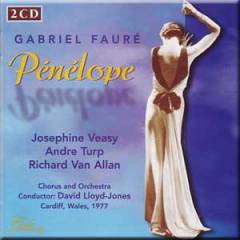Faure – Penelope (1977)
Faure – Penelope (1977)

Pénélope .............................. Joséphine Veasey Ulysse ................................ André Turp Eumée ................................. Richard Van Allan Euryclée .............................. Johanna Peters Eurymaque ............................. Neil Howlett Antinous .............................. Alexander Oliver Léodčs, un berger ..................... Gerald English Ctésippe .............................. Richard Angas Melantho .............................. Rosanne Creffield Cléone ................................ Sarah Walker Alkandre, Eurymone .................... Sara de Javelin Phulo ................................. Susan Lees Lydie ................................. Sally Le Sage Welsh National Opera Chorus BBC Welsh orchestra Dir.: David Lloyd-Jones Cardiff, 1977
The six years it took Fauré to complete his Pénélope have been multiplied no less than elevenfold for his 'poème lyrique' to reach the gramophone lists. Fauré has never been – and would never have wanted to be – a composer of vast popular appeal; Pénélope, with its rather pedestrian libretto and lack of stage action (until its violent ending), has not attracted opera-house managements; and its absence of big arias and detachable set-pieces has caused mere voice-fanciers to ignore it. Yet it is a work of outstanding quality, revealing strength as well as lyricism. Not coldly classical but warmly human, it concentrates (like Monteverdi's opera on the same subject) on the story of Ulysses's return, in disguise, to the wife who has lovingly waited 20 years for him, the attempt to bend his great bow by the importunate suitors she has kept at bay by a subterfuge, and Ulysses's eventual proclamation of his identity and slaughter of the detested parasites. Pénélope adopts a Wagnerian system of leading-motives (though the music, apart from the appearance of the Tristan chord, is far from being Wagnerian), and offers its singers, if not much depth of characterization, a great deal of expressive and gratefully written music. The love-theme, a variant of Fauré's favourite rising scale with a sharpened fourth (as in Lydia), is hauntingly beautiful. --- gramophone.co.uk
download: uploaded anonfiles yandex 4shared solidfiles mediafire mega filecloudio








